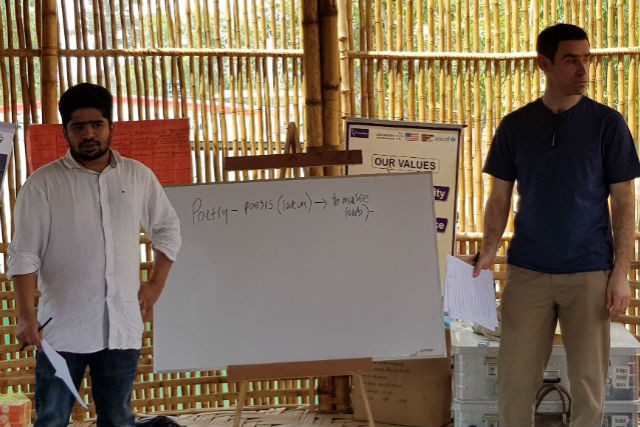“I am a Rohingya” was published on 1 August 2019 by poetry publishing house Arc Publications as a poetic response from Rohingyas who survived the mass-scale attacks in Myanmar.
According to the UN Office for the coordination of humanitarian affairs (UNOCHA), the Rohingya people have suffered decades of targeted violence, discrimination and statelessness in Myanmar. The turning point came in August 2017 when Myanmar military forces and Buddhist extremists began wide-scale attacks in the north-west Rakhine state. They looted, burned homes, killed Rohingya civilians on a mass scale and inflicted gang rape and sexual violence on women and children. This genocide prompted a refugee exodus on a massive scale to Bangladesh. According to the UNOCHA, in March 2019, there were over 909,000 stateless refugees living in camps in Bangladesh.
The project came almost two years after poet Shehzar Doja visited a Rohingya refugee camp in September 2017 with not-for-profit Friendship NGO.
“I began to notice how all the NGOs’ and governmental bodies’ focus was on healthcare and emergency relief, as it ought to be. But something vital was missing. Where were the archives of written literature, poetry and songs?” Doja explained.
He discovered a rich oral song tradition, which Doja set out to record, having songs transcribed into Bengali, which he then translated into English. A short time later, he met with established UK poet James Byrne, who co-edited Burmese poetry anthology “Bones Will Crow” published by Arc and for which he was awarded the Pen International Award. The pair came up with the idea for an anthology and in spring 2019 hosted a poetry workshop in Cox’s Bazar in Bangladesh, the world’s largest refugee camp (pictured below).

Photo: Shehzar Doja
“I think there were about 20 participants in the workshop. No female poets were at the workshop due to cultural norms,” Doja explained, adding that some participants had never written poetry before.
“They would go off in their own time and research and come back with some fantastic work. […] There’s a resilience and urgency to express themselves. I think that comes out in the poems,” he said.
Arc commissioned the anthology, which Doja and Byrne co-edited. The book is significant not only for shining a light on the plight of Rohingya refugees, but it also serves as a brave step by a people whose future hang in the balance and serves to lay the foundations for new writers in this community. Doja said: “They are sort of front-runners of this new generation of writers. Because there had been so much systematic oppression within the state of Myanmar in regard to education or access to health. None of these students were able to study at university level.”
Most of the poets whose works were published used pseudonyms, oftening starting with the name “Ro”. This, Doja explains, was a necessity to ensure their own safety, especially since talks are underway between the Myanmar state and refugee representatives to repatriate the refugees. “For the moment, life is very difficult for them there,” Doja said. He and Byrne hope to return to the Cox’s Bazar camp for further workshops and are also in talks to build a poetry library there in future.
“I am a Rohingya” can be purchased in paperback from most UK book stores.
